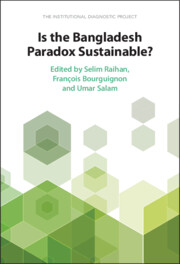Acknowledgements
We wish to acknowledge the precious help the editors and authors of this study received from many friends and colleagues. In the first place, we would like to thank Umar Salam, who has chiefly managed this project at Oxford Policy Management. We are also deeply grateful to the thematic study discussants, Thorsten Beck, Jaime de Melo, Chris Heady, Beth King, Dilip Mookherjee, and Jean-Philippe Platteau, for the crucial role they have played in providing critical remarks and advice. Deep thanks also go to Jean-Philippe Platteau, co-research directors of the EDI research programme, and Ravi Kanbur, member of the scientific committee of the institutional diagnostic research activity, for most valuable advice and comments. Their constant challenging of the arguments and conclusions of the study pushed the authors to produce higher-quality research. We also wish to thank the adviser of the project, Wahiduddin Mahmud, whose guardianship and advisory role on this work ensured it was of a high quality, informed by a diverse set of viewpoints, and situated in the reality of the Bangladeshi context.
We are also grateful to the enumerators and supervisors who helped during the institutional survey. We must acknowledge the decision makers (from the private and public sectors, representatives from international organisations and donors in Bangladesh, as well as from the civil society) who participated in the institutional survey in 2018/2019 and also in the policy engagement workshop in September 2018.
We also acknowledge the EDI team members at Oxford Policy Management, who contributed valuable insights and provided a management assistance to the process, including Stevan Lee, Mark Henstridge, Benjamin Klooss, Rachel Smith-Phiri, and Umar Salam. We also acknowledge Ashibur Rahman and Shoaib Ahmed from SANEM, for their coordination support in relation to the organisation of key events in Dhaka. We also wish to thank the academics and government officials who participated in the workshops and provided insights that helped us to understand a number of issues related to the development challenges in Bangladesh.
This project was funded with UK aid from the UK Government.

